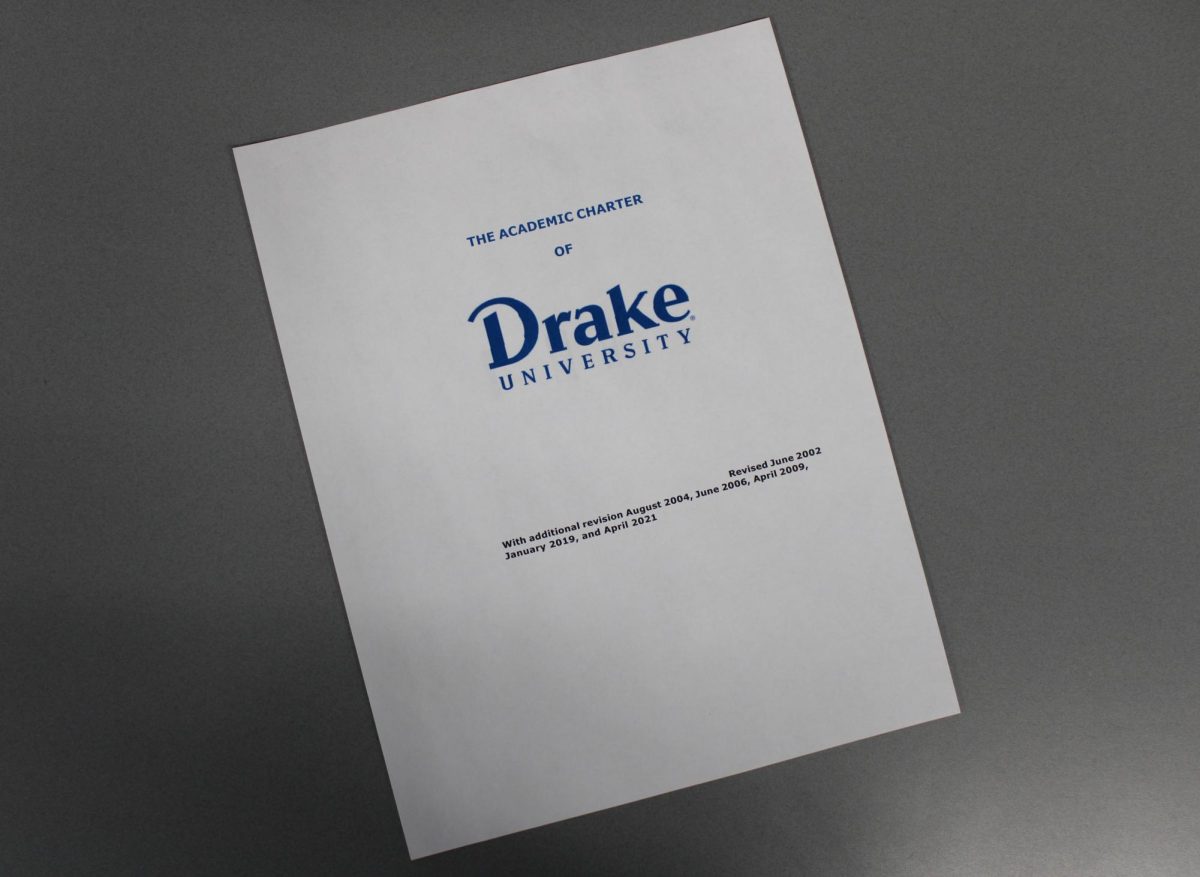For about two months, Drake University’s Faculty Senate has been carefully examining the proposed changes to the charter sent to Drake employees on Oct. 16. Drake’s charter was established in 1987 and regulates university life. With the proposed changes, Drake’s administration and Board of Trustees hope to keep the charter congruent with the American Association of University Professors guidelines and change Drake’s formal process for declaring financial exigency.
President Marty Martin and the Board of Trustees gave faculty until Dec. 6 to provide feedback, requesting that Faculty Senate lead the charge in gathering the overall opinions of their constituents.
Ultimately, the Board of Trustees has the final say over Drake’s charter, but the board and administration decided they would benefit from faculty feedback and wanted to promote the spirit of collaboration throughout the university, Provost Sue Mattison said.
“One of the best parts of shared governance is that when you are open to hearing input from diverse sources, the end product is going to be better,” Mattison said.
Jerrid Kruse, President of Faculty Senate, said this ensures that the charter represents all parties at Drake. He recognized that the board of trustees has the authority to modify the charter as they see fit. Still, he appreciates that they are given time to respond and construct a response that he believes will be taken seriously.
“I don’t know if I would come up with a better way to do it other than to provide a longer timeline or identify the concerns up front and then have faculty and board work together to come up with ways to solve these concerns,” Kruse said.
Faculty have a variety of opinions about the charter changes. Some saw the changes coming, while others were surprised when the president’s office announced this review process. Many view it as a response to the budget issues, but Kruse also pointed out that the charter needed some editing.
“It was a messy document, so cleaning it up makes some sense,” Kruse said. “We also know that the way Higher Ed is working, lots of universities are having budget issues, so ensuring that we know how to go forward and everybody’s kind of on the same page with how to go forward is probably one of the main drives.
To promote discussion, various department senators have hosted listening sessions and answered questions to get more feedback about the Charter changes. Kruse has also sent out a survey where faculty members can anonymously share their thoughts about the charter changes.
“We can never fully represent 100% of the faculty perfectly because people have different perspectives, so trying to understand the majority perspective or the patterns within the diverse perspectives is probably our best attempt,” Kruse said.
Based on this feedback, the Faculty Senate is considering five key points.
First, the faculty is concerned about specific language, such as “in concurrence with the provost.”
Second, the new charter modifies the concept of financial exigency, the formal process an institution utilizes to declare a financial emergency. The faculty hopes to add additional metrics to the latest definition.
“There’s nothing in that proposed new definition of financial exigency that makes it more or less likely that [the board of trustees and President Marty] would ever declare such,” President Martin said in a Faculty Senate meeting on Nov. 6. “There is no plan to declare such… We are on the right path and it’s a path that is recognized and affirmed by the board.”
Thirdly, the faculty hopes to improve shared governance and work more collaboratively. Specifically, Faculty Senate hopes to spark more collaboration between the Board of Trustees and the faculty through their shared governance recommendation.
“Right now, there is this separation, like the faculty are here and the Board of Trustees are over here,” Kruse said. “We don’t talk to each other very much.”
Kruse is in a unique position as Faculty Senate president. He attends all Board of Trustees meetings and frequently meets and converses with President Martin and Provost Mattison. Right now, he acts as a go-between but hopes to facilitate more direct conversations between the two parties.
“We’d like to increase that connection rather than just kind of having two or three individuals making that connection; we’d like to have lots of folks making those connections,” Kruse said. “It’ll be better for the board of trustees. It will be better for Faculty Senate and the broader faculty.”
Fourth, faculty will request that academic freedom be defined in alignment with the AAUP. Fifth, they want to protect consecutive-term faculty, which are faculty not on a tenure track.
The Faculty Senate split into groups to cover each topic more in-depth. Each group researched its specific issue, wrote a short paragraph for the executive summary, and provided two to three pages of more in-depth explanation of the recommendation.
“There is a lot of concern around this work and we’ve had to put in a lot of hours to draft our response,” Kruse said.
The administration hopes to incorporate more of the American Association of University Professors guidelines, which currently mainly exist in the appendix. The changes are meant to remove unnecessary information and eliminate occasional contradictions, allowing it to align more with the AAUP guidelines.
Additionally, Drake wants to ensure that its charter follows the most current version of AAUP guidelines. The last major revision to Drake’s charter was in 2002, but smaller revisions were made as recently as 2023.
“AAUP has updated a lot of their documents; ours has remained static,” Mattison said.
Mattison said these changes would also clean up the charter and clarify the roles of specific boards for everyone at Drake.
“The revisions are a clearer way of ensuring that everyone understands that the Board has ultimate authority and that they are invested in shared governance,” Mattison said.
The Board of Trustees and Mattison believe these edits will help decide how to finalize the charter changes. After the Faculty Senate’s recommendations are submitted on Dec. 6, President Martin and others will have time to review them and make the necessary changes before the Board of Trustees officially votes to change Drake’s charter in January.
“They’ll recommend edits that will make the proposed changes stronger,” Mattison said.








